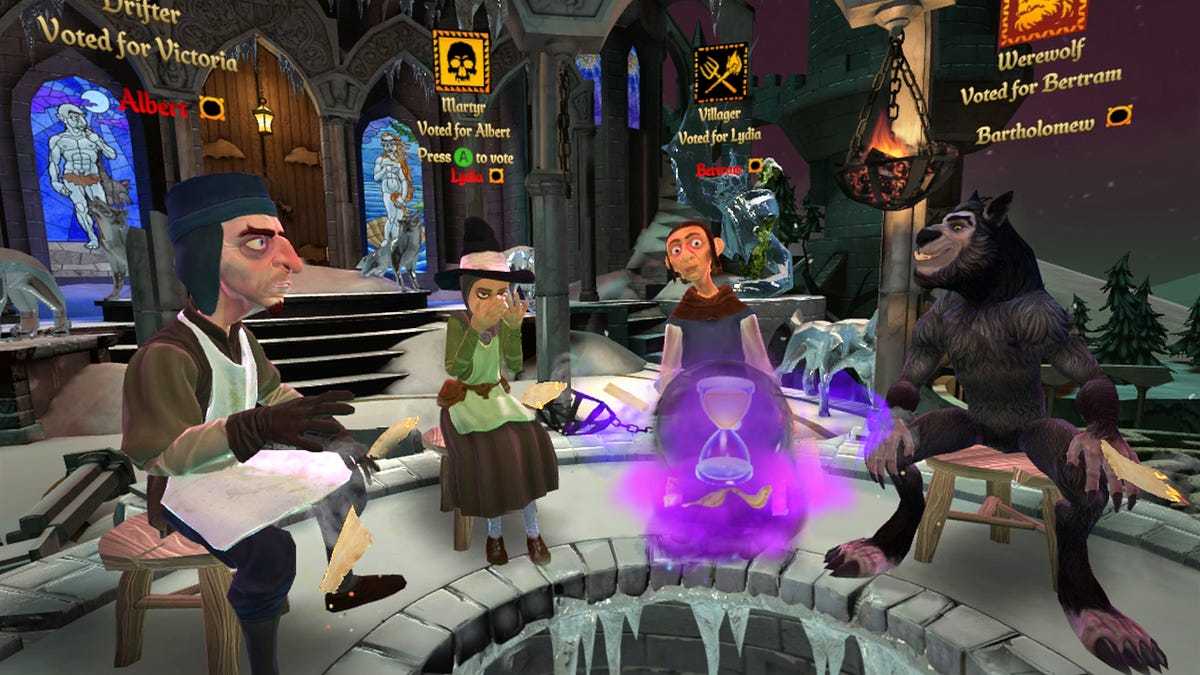Ubisoft's social VR twist is all about deceiving your friends
Werewolves Within wants you to suspect and accuse people, all using conversation in virtual reality. And it feels just like a game you'd play over beers.

I'm sitting at a campfire with four villagers. We're discussing which of us is a werewolf. We point fingers. We convince each other of our theories. We vote. Everyone decides to kill me, despite my protests. But then I reveal I'm the Deviant, the player who wanted to be killed. I win, and everyone loses. I look down at myself. I'm a caricature of an old woman gypsy.
We take off our Oculus Rift virtual reality headsets. I smile at the real players seated around me, and revel in victory.
Werewolves Within is a social game for VR from publisher Ubisoft. It's different to all the other VR games I've tried, because it's really a five-player casual party game played with a head-mounted display. The other four players are real people, fellow members of the press here at the Game Developers Conference in San Francisco. We chatted over VoIP. The game is quick, simple, psychological. It's about conversation.
Developed by Red Storm Entertainment, the studio behind Ubisoft's Tom Clancy and Far Cry games, Werewolves Within will launch later this year. According to Ubisoft, it's targeting "all major VR platforms," which could very well mean phone-based VR as well as high-end, PC-connected gear such as the HTC Vive and Oculus Rift.
The problem with virtual reality, for the most part, is that it isn't very social yet. But it's starting to be. The Samsung Gear VR launched its first social tools to link Facebook accounts into apps. And multiplayer games, while not common yet, will need to be part of what makes VR feel connected. I love board games, and this title is basically a distillation of that classic design: it's like the party game Mafia crossed with a haunted cartoon village flair. Players are assigned random roles before the game starts (Villagers with different skills, Werewolf, or the you-win-if-everyone-hates-you Deviant), and you then have to suss out via conversation and hints who everyone is.
Conversation carries the game.
Why not just play a game like this in real life around a real table? You might not have four other friends to hand. And while you could easily play this without VR, Werewolves Within uses voice analysis to animate the cartoon avatars appropriately with emotions. Sometimes I wondered if it was really working, but everyone else's characters seemed sufficiently animated for the illusion to work (but a bit stiff, like puppets).
"Social VR" will be a big part of many developers' strategies as everyone plans for us to spend more time with goggles on our faces. I'm not sure it will all succeed, but it definitely needs to happen to make VR feel like a real, living place to be.
But what's even more interesting is this: we're all wearing masks. I pull the left trigger on my controller to see myself, and I'm not who I appear to be. What will others see me as? What do I see others as? And how does virtual reality manipulate this? Werewolves Within does it in a fun party game. But masks and VR seem like they go perfectly hand in hand.

